仁爱版九年级上期U1T1SD
九年级上册仁爱英语U1t1
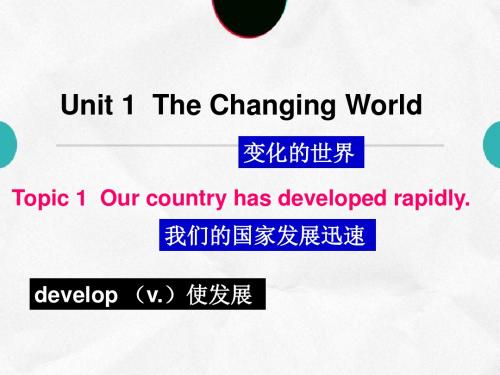
hometown has become her __________ beautiful more and more __________ it is beautiful but there were people too many ________ improve his English to _________
have/has gone to 5. 到„„去了(去而未归)________________
6. 上课铃响了。
There goes the bell. _________________
=That’s the bell. = The bell is ringing.
The next day, Maria came back. She met Michael in the school.
v. 关闭,关上
shut up 闭嘴,住口
Fill in the blanks.
1. We should help the d________ isabled people when they are
in trouble.
2. — It’s getting colder now. Would you please s____ hut the door? — Sure. 3. He told me that he took __________ part in (take part in) an
1b Listen to 1a and complete the table.
Rita
places near many _______ India the home in ______ Mount ________ Huang has been to with her _________ parents summer an English _______ school Cuba to be a ______ has gone to volunteer
仁爱初中英语九年级上册第一单元Topic 1SectionD(共17张PPT)

1. Some words: leisure, hide-and-seek, chess, radio,
spare, abroad 2. Some phrases:
play an important part in, play hide-andseek, play chess, in one’s spare time, make a tour abroad
complete the table
playing hideand-seek
playing cards or chess
In the past
watching operas
listening to the radio
playing and watching team sports
playing games on computers
Group Work
1.Read the text and write down the new words.
2.Read the text and write down the new phrases.
3.Write down the main idea of each paragraph.
Try to retell the text according to the pictures
Young people like to play games on
computers or chat on the Internet. In
recent years, more and more people love to
travel during vacation . They go to visit
A lot of people love both to play and to
仁爱英语九年级上教案新部编本参考U1T1SAU1T2SD
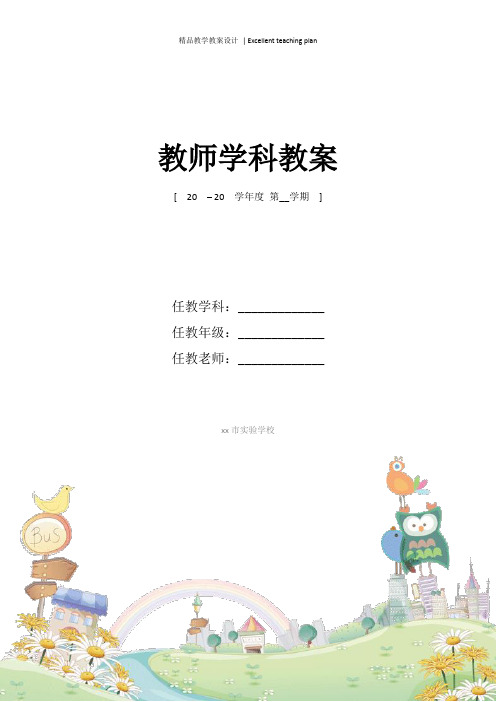
教师学科教案[ 20 – 20 学年度第__学期]任教学科:_____________任教年级:_____________任教老师:_____________xx市实验学校Section DⅠ. Material analysis本课是九年级第一单元第二话题的第四课时,是一堂复习课,主活动是1和Project。
学生通过Grammar和Functions来巩固本话题的语法重点现在完成时以及本话题重点功能句,尤其是要体会现在完成时的标志性副词的用法和区别。
1通过对比北京和加拿大小镇的生活方式,要求学生关注不同的生活环境,并进一步提升阅读能力,教会学生利用图表突破阅读障碍的策略。
2要求学生运用课文知识,根据自身的喜好来选择居住地,写篇小短文。
其实是在让学生为城乡生活找到更多的各自的优点。
Project的活动还是和人口有联系。
只是范围由国家变成小家。
通过小家来反映人多和人少的优劣,并让学生了解不同的家庭类型。
通过城乡生活的对比,让学生关注不同的生活方式,从而为学生树立正确的居住观念。
Ⅱ.Teaching aims1.Knowledge aims:掌握本课的重点词汇和短语,复习现在完成时和重点的表达法。
谈论不同的生活环境和生活方式。
2.Skill aims:培养学生的阅读能力和阅读技巧。
培养学生能通过看图表理解文章,扫清阅读障碍的能力。
增强知识迁移能力,模仿并掌握写作技巧。
3.Emotional aims: (optional)比较不同的生活方式,为自己的理想生活而努力。
4.Culture awareness: (optional)引导学生了解不同地域的不同生活方式,以及中西方文化和人口差异的密切联系。
Ⅲ. The key points and difficult points1. Key points:Words and phrases: local, capital, huge, market, excellent, surround, garbage,discourage, transportationclose to; discourage doing sth.Sentences: I live in a small town called Fairmont.The small town is surrounded by trees.2. Difficult points:巩固现在完成时中标志性副词的用法及区别。
仁爱版九年级英语上册U1T3SD优质教案
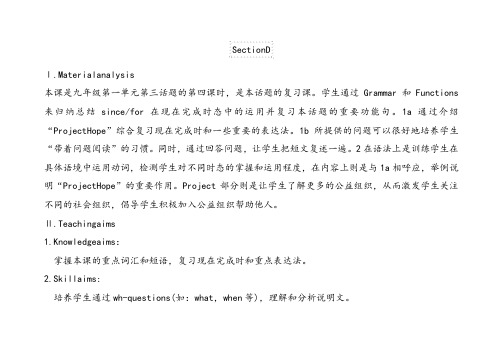
SectionDⅠ.Materialanalysis本课是九年级第一单元第三话题的第四课时,是本话题的复习课。
学生通过Grammar和Functions 来归纳总结since/for在现在完成时态中的运用并复习本话题的重要功能句。
1a通过介绍“ProjectHope”综合复习现在完成时和一些重要的表达法。
1b所提供的问题可以很好地培养学生“带着问题阅读”的习惯。
同时,通过回答问题,让学生把短文复述一遍。
2在语法上是训练学生在具体语境中运用动词,检测学生对不同时态的掌握和运用程度,在内容上则是与1a相呼应,举例说明“ProjectHope”的重要作用。
Project部分则是让学生了解更多的公益组织,从而激发学生关注不同的社会组织,倡导学生积极加入公益组织帮助他人。
Ⅱ.Teachingaims1.Knowledgeaims:掌握本课的重点词汇和短语,复习现在完成时和重点表达法。
2.Skillaims:培养学生通过wh-questions(如:what,when等),理解和分析说明文。
能够读懂有关组织机构简介的文章。
3.Emotionalaims:(optional)关注失学儿童,珍惜现在的美好生活和学习机会。
4.Cultureawareness:(optional)了解社会服务机构的宗旨、功能和取得的成绩。
通过对国际性社会公益组织的了解,关注社会的发展与进步。
Ⅲ.Thekeypointsanddifficultpoints1.Keypoints:Wordsandphrases:project,primary,encourage,development,continue,college,aid,contributio n,moral,respect,importanceaffordaneducation,by2012,primaryschool,makeacontributionto,moraldevelopment,respectthe irteachers,oneanother2.Difficultpoints:能学会归纳话题中重点语法和表达法。
仁爱九年级上册U2T1SD

7. She asked, “Whose house will he break into next time ?” She asked whose house ____ break into _____. A. will he…next time B. would he…the next time C. he would…the next time D. he will…next time
变化前) 直接引语 (变化前 变化前 祈使句
间接引语(变化后 间接引语 变化后) 变化后 不定式
The officer said to The officer ordered him, “Don’t leave him not to leave his your post.” post.
由直接引语转变为间接引语,有时会引时 由直接引语转变为间接引语 有时会引时 态的变化, 态的变化 注意以下几个方面
变化前) 直接引语 (变化前 变化前 特殊疑问句 you return me the
间接引语(变化后 间接引语 变化后) 变化后 wh-词引导的宾语从 词引导的宾语从 John asked Mary return him the book.
“Mary, when will 句 book?” asked John. when she would
Review
Look and match. Look at the pictures and say which kind of pollution they are.
air pollution
light pollution
litter
water pollution soil pollution noise pollution
仁爱版英语九年级上册Unit1Topic1Ourcountryhasdevelopedrapidly

SectionB 同步测试题一、依照英文释义选择单词。
volunteer, disabled, ever, rope,shut1. ________ very strong, thick string (线)made by twisting(抒)thinner strings2. ________ not able to use a part of your body completely (完全)or easily3. ________ to make sth. close4. ________ at any time5. ________ a person who does a job without being paid二、单项选择。
1. I haven’t seen Peter, my old friend, a long time. I miss him a lot.A. withB. ofC. sinceD. for2. To help others ______ us _______.A. make;happilyB. make; happyC. makes; happyD. makes; happily3. May is a writer. She ________ more than ten books since 1980.A. writesB. has writtenC. wroteD. will write4. ________ I don’t have enough mon ey to buy everything for my little son, I can give him all the happiness.A. IfB. ThoughC. ButD. Ever5.—Have you _____ been to Shaolin Temple?—No, I have______ been there.A. just ;alreadyB. ever ;neverC. yet ;justD. often ;usually三、用所给单词的适当形式完成对话。
仁爱英语九年级上册U1T1SCD

学习内容
年级 英语_ 学 案(一)
主备教师: 潘霞
备课成员:_潘霞
王佳_
学生姓名:
___
授课时间: _____年
月
_日
3、We ______ Xiao Li since she was a little girl . A. know B. had known C. have known D. Knew Topic 1 Our country has developed rapidly. Section C 4、Harry Potter is a very nice film .I_______ it twice . 1.掌握本课的重点词汇和短语,继续学习现在完成时。 A. will see B. have seen C. saw D.see 学习目标 2.培养学生的阅读技巧,利用图片和语境猜测词义,提高写作能力。 5、—______ you ___ your homework yet ? 3.引导学生了解过去, 珍惜现在和展望未来, 培养其热爱生活的积极态度。 —Yes . I _____ it a moment ago . 1.重点:本课的重点词汇和短语以及现在完成时。 A. Did ; do ; finished B. Have ; done ; finished 重、难点 2.培养学生通过语境, 猜测生词、 短语的意思以及找出各个段落的中心句。 C. Have ; done ; have finished D. will ; do ; finish 一.读 5-6 页 1a,从短文中找出下列短语翻译并读熟。 6、 His father ______ the Party since 1978 . A. joined B. has joined C. was in D. has been in 1.超过;多于 more than 2.亲自目睹 see ...oneself 7、 Miss Green isn't in the office . she_______ to the library . 3.in the 1960s 在二十世纪 60 年代 4.living condition 生活条件 A.has gone B. went C.will go D. has been 5.环形路 ring road 6.挤在 be crowded into 8. Hi, Li Hong, Xiao Gang has ____ called you. Where have you been? A. just now B. now C. just D. never 7.很少的孩子 few children (few+可数名词复数,表否定意义) 三、选词填空 8.很少的钱 little money (little+不可数名词复数,表否定意义) 9.有机会做某事 have chance to do sth 10.接受良好的教育.receive a good education 12.通过书信和电报的方式 by letter or telegram 13.改革开放 reform and opening-up 16.满足人们的需要 satisfy people’s needs 17.不但…而且… not only...but also 19.而且 What’s more 23.记住过去 remember the past 25.展望未来 dream about the future 二、单项选择题 1、He has _______ been to Shanghai three times. A. already B.never C.ever D. still 2、—Our country ______ a lot so far . —Yes . I hope it will be even ______ . A. has changed ; well B. changed ; good C. has changed ; better D. changed ; better 18.医疗保健 medical care 20.变得方便快捷 become easier and quick 24.立足现在 live in the present 14.越来越多的 more and more 15.变得更加高大明亮 become taller and brighter 11.远方的 far away
仁爱英语九年级上册U1T1SD的教学设计

Unit 1 The Changing WorldTopic 1 My hometown has become more andmore beautiful.Section DThe main activity is 4. 本课重点活动是4。
Ⅰ. Teaching aims and demands 教学目标1. Learn some new words and phrases:note, composition, consider, draw up, tool, thanks to2. Review and sum up the present perfect tense.3. Talk about changes and their effects on society.Ⅱ. Teaching aids 教具教学挂图/录音机/多媒体课件或小黑板Ⅲ. Five-finger Teaching Plan 五指教学方案Step 1 Review 第一步复习(时间:12分钟)通过做调查描述家乡面貌以及人们业余活动的变化,复习现在完成时态,并学习部分生词。
1. (检查作业,要求学生轮流描述家乡巨变。
)T: We have known the changes around us. Let’s talk about them together.(教师引导学生描述一些家乡生活条件的变化。
)S1: The roads in the past were narrow and dirty. Now there are many clean and wide ring roads in the cities.S2: We have big houses to live in. They are very comfortable.S3: We have different kinds of food to eat and fashionable clothes to wear.S4: We can use computers, telephones, and fax machines to make our communications faster and easier.…(教师可用提示性的单词如road, house, food,让学生一起来描述。
九年级上仁爱英语U1t1复习课件

(三)重要句型:
1.Parents couldn’t afford education for their children. 父母供不起孩子上学。
afford 常与can, could 或 be able to 连用,尤其用于否定句或疑问句,表 “负担得起(做)某事;抽得出(时间)” “(can’t/ couldn’t) afford (to do) sth.”
他已经完成了任务。
否定句: He hasn’t finished the task. 他还没有完成任务。
一般疑问句: Has he finished the task? 他已经完成任务了吗?
回答:
Yes, he has. 是的,他完成了。 No, he hasn’t. 不,他没有完成。
特殊疑问句: What has he finished?
(二)重点语法
现在完成时:
用法一: 表示过去已经发生或已经完成的某一动作对现在造成的影响或结果 即“过去的动作 + 现在的结果”, 强调结果。
栗子: I have bought a new bike. (= I bought a new bike, and I have a new bike now.) 我已经买了一辆新的自行车。(强调我现在有了一辆新车。)
2.Our government gives support to poor families.我们的政府能为贫困家庭提供帮 助g。ive support to sb.= give sb. support 为某人提供帮助/ 支持
support作动词时表“供养;支持;支撑”,如:
She had to support her family at the age of ten. 她十岁时就得养家。
九年级仁爱英语上册U1T1课文翻译
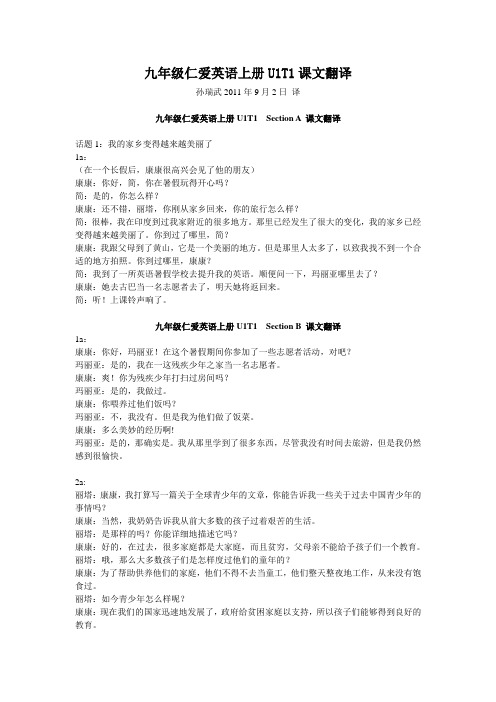
九年级仁爱英语上册U1T1课文翻译孙瑞武2011年9月2日译九年级仁爱英语上册U1T1 Section A 课文翻译话题1:我的家乡变得越来越美丽了1a:(在一个长假后,康康很高兴会见了他的朋友)康康:你好,简,你在暑假玩得开心吗?简:是的,你怎么样?康康:还不错,丽塔,你刚从家乡回来,你的旅行怎么样?简:很棒,我在印度到过我家附近的很多地方。
那里已经发生了很大的变化,我的家乡已经变得越来越美丽了。
你到过了哪里,简?康康:我跟父母到了黄山,它是一个美丽的地方。
但是那里人太多了,以致我找不到一个合适的地方拍照。
你到过哪里,康康?简:我到了一所英语暑假学校去提升我的英语。
顺便问一下,玛丽亚哪里去了?康康:她去古巴当一名志愿者去了,明天她将返回来。
简:听!上课铃声响了。
九年级仁爱英语上册U1T1 Section B 课文翻译1a:康康:你好,玛丽亚!在这个暑假期间你参加了一些志愿者活动,对吧?玛丽亚:是的,我在一这残疾少年之家当一名志愿者。
康康:爽!你为残疾少年打扫过房间吗?玛丽亚:是的,我做过。
康康:你喂养过他们饭吗?玛丽亚:不,我没有。
但是我为他们做了饭菜。
康康:多么美妙的经历啊!玛丽亚:是的,那确实是。
我从那里学到了很多东西,尽管我没有时间去旅游,但是我仍然感到很愉快。
2a:丽塔:康康,我打算写一篇关于全球青少年的文章,你能告诉我一些关于过去中国青少年的事情吗?康康:当然,我奶奶告诉我从前大多数的孩子过着艰苦的生活。
丽塔:是那样的吗?你能详细地描述它吗?康康:好的,在过去,很多家庭都是大家庭,而且贫穷,父母亲不能给予孩子们一个教育。
丽塔:哦,那么大多数孩子们是怎样度过他们的童年的?康康:为了帮助供养他们的家庭,他们不得不去当童工,他们整天整夜地工作,从来没有饱食过。
丽塔:如今青少年怎么样呢?康康:现在我们的国家迅速地发展了,政府给贫困家庭以支持,所以孩子们能够得到良好的教育。
丽塔:哦,他们是幸运的。
最新仁爱版九年级英语上册Unit1Topic1SectionD课件上课讲义

e.g. Reading books plays an important part in his life.
in one’s spare/free time 在某人的业余时间
e.g. She often goes shopping in her spare time.
chatting on the Internet
traveling all over the world
1. Leisure activities play an important part in people’s lives. 休闲活动在人们的生活中起着重要的作用。
play a/an… part = play a/an… role 扮演……角色;起……作用;有……影响 e.g. Computer plays an important part in our
e.g. They plan to make a tour abroad next year.
abroad adv. 在国外,到国外
be abroad 在国外 go abroad 去国外 at home and abroad 国内外
1b Read 1a and answer the following questions.
仁爱版九年级英语上册Unit1Topic1S ection D课件
Section D
Functions
There goes the bell. =That’s the bell. = The bell is ringing. What a wonderful experience! = How wonderful the experience is! Though I had no time to travel, I still felt very happy. = I had no time to travel, but I still felt very happy. To help others makes us happy. make sb./sth. + adj.
仁爱版九年级英语上册U1T1SD优质教案
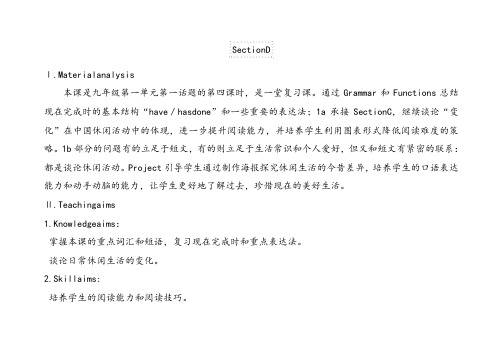
SectionDⅠ.Materialanalysis本课是九年级第一单元第一话题的第四课时,是一堂复习课。
通过Grammar和Functions总结现在完成时的基本结构“have/hasdone”和一些重要的表达法;1a承接SectionC,继续谈论“变化”在中国休闲活动中的体现,进一步提升阅读能力,并培养学生利用图表形式降低阅读难度的策略。
1b部分的问题有的立足于短文,有的则立足于生活常识和个人爱好,但又和短文有紧密的联系:都是谈论休闲活动。
Project引导学生通过制作海报探究休闲生活的今昔差异,培养学生的口语表达能力和动手动脑的能力,让学生更好地了解过去,珍惜现在的美好生活。
Ⅱ.Teachingaims1.Knowledgeaims:掌握本课的重点词汇和短语,复习现在完成时和重点表达法。
谈论日常休闲生活的变化。
2.Skillaims:培养学生的阅读能力和阅读技巧。
培养学生能通过语境,扫清阅读障碍的能力。
3.Emotionalaims:(optional)让学生更好地了解过去,珍惜现在的美好生活。
4.Cultureawareness:(optional)Ⅲ.Thekeypoint sanddifficultpoints1.Keypoints:Wordsandphrases:hide,chess,radio,spare,abroad,leisure,hide-and-seek,recentleisureactivities,playanimportantpart/rolein…,playhide-and-seek, playchess/cards,variouskindsof…,inrecentyears,makeatourabroad2.Difficultpoints:能学会归纳话题中重点语法和表达法。
能将所学知识运用到实际生活中进行交谈。
Ⅳ.Learningstrategies通过语法和功能部分的复习,能够学会归纳和总结个人的学习方法。
仁爱教育出版社九年级上U1-T1知识点
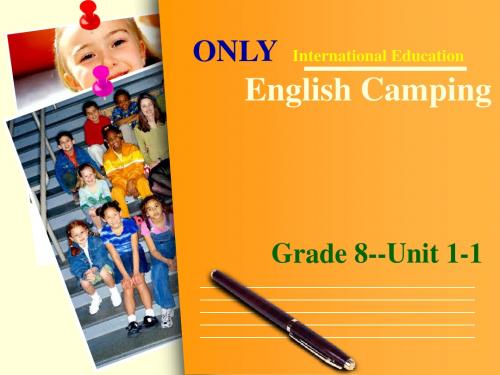
A Context
10.I've learnt a lot from it. Learn .....from ...从...中学习(到)..... Eg. I learnt a lot from my friends. 11.Though I had no time to travel, I still felt very happy. 连词though /although /even though/ even if 意为“虽然,尽管, 即 使”,引导让步状语从句,通常不与but连用。 eg:Though/Although my daughter is only ten years old, she knows a lot. Even though/Even if the work was hard, they enjoyed themselves. even if 和 even though 带有强调的意味,语气较强;though和 although语气弱,而though比although更口语化。 Have (no) time to do sth有(没有)时间做某事 Eg. I have time to see you. 12.She has lived in Beijing for more than forty years. More than=over超过,多于。 13.She has seen the changes in Beijing herself. See sth oneself亲眼所见,亲眼目睹 Eg. I saw him helping others myself.
A Context
12.people kept in touch with their friends and relatives far away mainly by letter or telegram. keep in touch with ... 与.....保持联系 far away遥远,常放在句末 Eg. They live in a village far away. 13.China has developed rapidly since the reform and openingup. develop v .发展,发达。 developed adj.发达的。developing adj 发展中的。 development发展 Eg. China is a developing country. 14.Children can study not only in modern schools but also on the Internet. Not only ...but also.. 不但...而且(就近原则) Eg. Not only he but also I have been to Canada.
仁爱版九年级英语上册 Unit 1 Topic 1 Section D 课件(共21张PPT)

lives
life--- lives live--- lives
n. 生活,生命 v. 居住,生活
2. Watching operas and listening to the radio were the main activities in their spare time. 看戏和听广播 是他们在空闲时间的主要活动。
Jim has finished doing his homework already. He is free now. 2. 他昨天收到一封信。 He received a letter yesterday. 3. 我父亲到长城去了。 My father has gone to the Great Wall. 4. 她还没有看过那部新电影。 She hasn't seen the new film. 5. 他这些天上哪儿去了? Where has he been these days?
l___T_h_a_n_k_s_t_othe government’s efforts, Li Ming’s hometown is becoming better and better.
Translate the following sentences into English. 1. 吉姆已做完作业,他现在有空了。
3. They go to visit some places of interest, and some people even make a tour abroad to see the world. 他 们去参观名胜古迹,有些人甚至去国外旅游。
make a tour abroad 去国外旅游
e.g. They plan to make a tour abroad next year.
2017年九年级英语上册第一单元知识点仁爱版
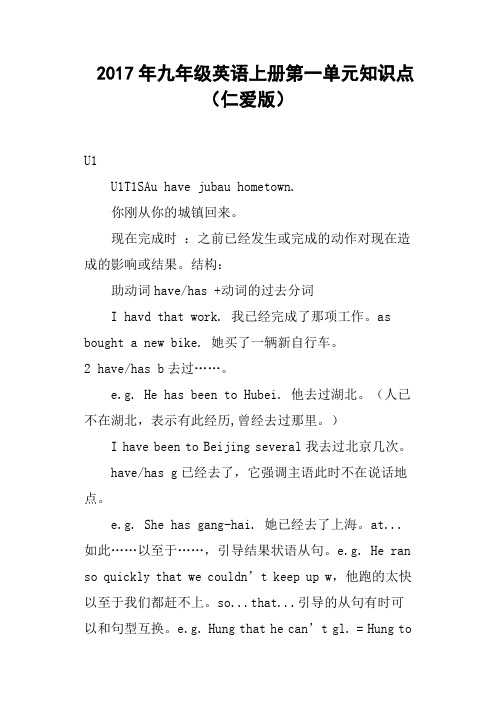
2017年九年级英语上册第一单元知识点(仁爱版)U1U1T1SAu have jubau hometown.你刚从你的城镇回来。
现在完成时:之前已经发生或完成的动作对现在造成的影响或结果。
结构:助动词have/has +动词的过去分词I havd that work. 我已经完成了那项工作。
as bought a new bike. 她买了一辆新自行车。
2 have/has b去过……。
e.g. He has been to Hubei. 他去过湖北。
(人已不在湖北,表示有此经历,曾经去过那里。
)I have been to Beijing several我去过北京几次。
have/has g已经去了,它强调主语此时不在说话地点。
e.g. She has gang-hai. 她已经去了上海。
at... 如此……以至于……,引导结果状语从句。
e.g. He ran so quickly that we couldn’t keep up w,他跑的太快以至于我们都赶不上。
so...that...引导的从句有时可以和句型互换。
e.g. Hung that he can’t gl. = Hung togl. 他太小了,还不能上学。
ve 意为“提高,(使)好转,,改善”。
a.可作及物动词。
improve oneself自我提高。
e.g. He has improved his health. 他的健康状况得到了改善。
b.可作不及物动词。
e.g. His healving. 他的健康状况正在好转。
另:improve on/u对……做出改进。
e.g. He has improvedvention.他进一步完善了他的发明。
improv改进(处),增进,事物。
5 by the way 顺便问一问。
e.g. By the way, do you know him? 顺便问一问,你认识他吗?6 There gbell.=That’s the bell.=The bell is ringing.铃响了。
- 1、下载文档前请自行甄别文档内容的完整性,平台不提供额外的编辑、内容补充、找答案等附加服务。
- 2、"仅部分预览"的文档,不可在线预览部分如存在完整性等问题,可反馈申请退款(可完整预览的文档不适用该条件!)。
- 3、如文档侵犯您的权益,请联系客服反馈,我们会尽快为您处理(人工客服工作时间:9:00-18:30)。
The government _______________ poor gives support to families, so... _________________________ China, all With the development of those things have changed. People ________________ their friends and kept in touch with relatives far away __________ mainly by letter or telegram. Beijing has made rapid progress and it has already succeeded in _____________ hosting the 2008 Olympic Games. __________ the government’s efforts, Li Thanks to Ming’s hometown is becoming better and better.
Example:
Look at the pictures. Then discuss the changes which have taken place in Li Ming’s hometown. Write a composition with the help of the notes and outline.
take exercise Have you ever taken exercise?
go climbing Have you ever gone climbing?
Pair work
Example:
A: Have you ever ...?
B: Yes, I have.
No, I haven’t. But I have ...
good time.
After this visit, my friend and I decided to do more things to help them. Now more than 30 volunteers have joined our
club. Everyone thinks the experience is wonderful.
1. Both his parents look sad. Maybe they ______ what happened to him. A. knew B. have known C. must know D. will know 2. —Our country ______ a lot so far . —Yes. I hope it will be even ______ . A. has changed ; well B. changed ; good C. has changed ; better D. changed ; better 3. —These farmers have been to the United States. —Really ? When ______ there? A. will they go B. did they go C. do they go D. have they gone 4. Miss Green isn't in the office . she ______ to the library. A. has gone B. went C.will go D. has been 5. The students have cleaned the classroom, ______ ? A. so they B. don’t they C. have they D. haven’t they
Unit 1 The Changing World
Topic 1 My hometown has become more and more beautiful. Section D
(录音)
重庆市万盛区104中学
集体备课组
care for the old
an organization
Work alone Listen to the tape and fill in the blanks. (录音)
I can’t find him. B: He has gone to the
restaurant.
sb. have/has gone to …
3a Grammar focus
(录音)
Present perfect (Ⅰ)
Now our country has developed rapidly. I haven’t seen him for a long time. Have you ever fed them?
Homework Write your own composition about Changes in Li Ming’s
Hometown.
Translate the following sentences into English.
1. 吉姆已做完作业,他现在有空了。 Jim has finished doing his homework already.
He is free now. 2. 他昨天收到一封信。 He received a letter yesterday. 3. 我父亲到长城去了。 My father has gone to the Great Wall.
4. 她还没有看过那部新电影。 She hasn't seen the new film.
5. 他这些天上哪儿去了?
Where has he been these days?
Useful expressions
_____ was your trip? How In one place I saw children ____________ a working for cruel boss. I felt sorry _____ them. for There goes the bell. _________ I’ve _________ a lot __________ it. learnt from Though I had no time ___________, I still felt to travel very happy. Can you describe it ___________? in detail Is that _____? so
Choose the best answer.
1. I saw his parents ______ on the playground this morning. A. run B. running C. runs D. to run 2. He failed in the English exam. I ______ him. A. felt sorry for B. felt happy for C. felt angry for D. felt pleased with 3. ______ the teacher, I have made great progress. A. Thanks to B. Thank for C. Thanks D. Thank 4. We now ______ him by writing letters. A. keep away from B. keep on C. keep distance D. keep in touch with
danced played They sang, _______ and _____ ______ with the old people there. games
The old people were ________ at their visit. excited
More than 30 _____________ volunteers have joined their club.
Example:
Outline
Title: Changes in Li Ming’s Hometown Body:
a. Changes in living conditions
b. Changes in working tools
C. Changes in education
... Conclusion: Thanks to the government’s efforts, Li Ming’s hometown is becoming better and better.
现在完成时
肯定句:主语+have/has+过去分词
否定句:主语+ haven’t/hasn’t+过去分词
疑问句:Have/Has+主语+过去分词
A: Where have you been?
B: I have been to the park.
sb. have/has been to…
A: Where has Mr. Lee gone?
听力原文
(录音)
There is a very popular organization for young people in our community. I joined it two years ago. And I have taken part in many interesting activities. What we have done can not only help others but also make ourselves happy. Last Sunday, we went to an old people’s home. After
Have you ever cared for the old?
